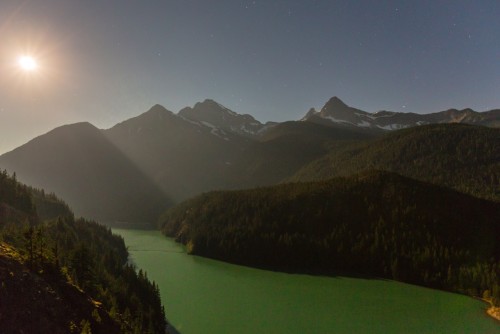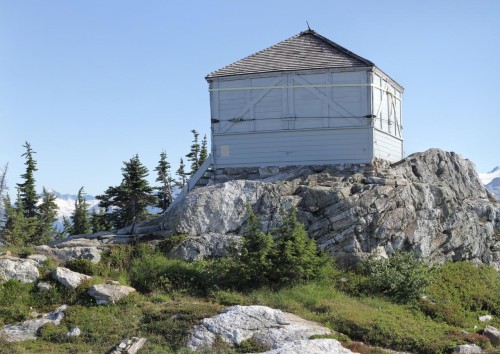Tim McNulty's "Night, Sourdough Mountain Lookout"

“Night, Sourdough Mountain Lookout”
Poem by Tim McNulty; a reading with Rob Rich
A late-summer sun
threads the needles of McMillan Spires
and disappears in a reef of a coral cloud.
Winds roil the mountain trees,
batter the shutter props.
I light a candle with the coming dark.
Its reflection in the window glass
flickers over mountains and
shadowed valleys
seventeen miles north to Canada.
Not another light.
The lookout is a dim star
anchored to rib of the planet
like a skiff to a shoal
in a wheeling sea of stars.
Night sky at full flood.
Wildly awake.

During our recent lunar eclipse, I know an awestruck child who asked that most earnest strain of seven-year old sincerity: “Daddy, where’s earth?” Though I had lacked the courage to so boldly echo her question, I couldn’t help but to smile in agreement. Just how is it that our real experience on this planet be so utterly surprising and mysterious…so unearthly?
When rational logic fails, it helps to have the poets around. The best poets are seers who freshen observation with association and align sight with insight. Tim McNulty is chief among them, and this first piece collected in his chapbook Through High Still Air reveals his knack for distilling wide and wild moments into precise images of time and place.
His title and opening lines here convey this is not just any night, but a night in which he has a specific role: to keep watch. After our fires this year, we can surely appreciate the smoke-distorted suns that McNulty saw in 2003, as well as how westerly winds can thwart a fire fighter’s best intentions. Sourdough Mountain Lookout had been vacant for many years, but in the Beaver Creek fires of 2003, steady eyes from a still point became a surprising necessity.
McNulty had not worked lookouts prior to this 2003 stint, but Wilderness District Ranger Kelly Bush knew he would deliver. Bush met McNulty through trail work in the Olympics and knew of his alpine savvy, his skill in observation and his attraction to the poets Philip Whalen and Gary Snyder who served in Sourdough fifty years before. In the time of need, McNulty accepted, and the Osborne Fire Finder quickly became his favorite tool. With its guiding sights keyed above a circular topographic map, McNulty would sketch the horizon’s endless crenellations that first week, preparing to track the changing flames.
Those moments are still vibrant for McNulty today, even as he recalls the shock of entering the dark alone, high above fire.
His lone candle is a poignant image in this poem, a resemblance hinting that the wildland blazes below are in a way allied to the attention kindled within the lookout and the “wheeling sea of stars” above. Each is a beacon with intensity that is both centered and spreading, even as they are countered by the wide, overwhelming mystery of the night. For all we comprehend or pretend to know, such flickers always surprise – in McNulty’s poetry as well as in life – and lure us to look on.
Because “he didn’t have to go down” as in his day hiking visits, McNulty could appreciate the finer changes in alpine light and atmosphere, the pocket tarns and snowmelt ponds, as well as the black bear, short-tailed weasels and deer with migrating hawks pulsing by. “I sure didn’t expect to find a swimming hole,” McNulty chuckles today.
But this poem, and the collection of which it is apart, affirms his subtle hint within the humor: that even though few professions allow (or demand) such vigilance to our surroundings as being a lookout, the possibility of being “wildly awake” is always available to us, overhead and underfoot, day and night.
Rob Rich is a naturalist and writer. He holds a BA in Environmental Studies from the University of Montana and a MS in Natural Resources from the University of Vermont. Rob is completing a Communications Internship with North Cascades Institute as part of further studies in writing at Western Washington University. He also works on contract with the Whatcom Land Trust and serves as a board member for the Nooksack Salmon Enhancement Association and the Natural History Network. You can find his writing in High Country News, Sierra, Camas, The Catch, Northern Woodlands and Adirondack Journal for Environmental Studies. You are likely to find him prowling the woods and beaver ponds near his home in Bellingham, where he loves to seek out the songs of Pacific wrens.

